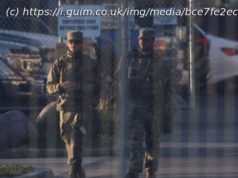Amid outcry over Confederate markers, new ones are going up
While Confederate statues and monuments around the nation get removed, defaced, covered up or toppled, some new memorials are being erected, by people who insist their only purpose is to honor Civil War soldiers who died for the South.
Supporters of these new monuments describe a determination to hold onto their understanding of history.
«What I want to get across is how much the South suffered, not only through the war but after the war, during the Reconstruction years,» said David Coggins, who owns the Confederate Veterans Memorial Park in Brantley, Alabama, which dedicated a memorial to «Unknown Alabama Confederate Soldiers» in September.
Others say race has nothing to do with these new monuments, unlike those erected in the years after the war.
«The problem was with some of the other statues that were put up, that were basically intended to intimidate people,» said Danny Francis, commander of a Sons of Confederate Veterans unit in South Carolina. His group is dedicating a $5,000,7-foot (2.1-meter) monument Saturday on private land where Civil War enthusiasts from North and South re-enact the Battle of Aiken each year.
«We’re not trying to oppress anyone — we’re just historians. We welcome everybody,» Francis said.
The new markers still send a discriminatory message, according to the National Association for the Advancement of Colored People.
«We’re trying to heal a nation, and with more and more of these going up, it’s a continuous slap in the face,» said Benard Simelton, president of the NAACP’s Alabama conference. «These Confederate generals and soldiers committed acts of treason. They fought against the Union, but ‘for’ slavery. The Confederacy fought to maintain the status quo of slavery and white supremacy.»
In New Orleans, Baltimore, Richmond and other Southern cities, some political leaders now openly challenge the idea that these markers are about «heritage.» They’ve described how many were erected in the early 1900s, when white mobs were terrorizing black communities, and states were reversing Reconstruction-era gains by former slaves and imposing discriminatory Jim Crow laws to ensure white power.
Supporters of the new markers say they’ve got nothing to do with that part of history, and no link to the hate groups defending other Confederate monuments .
«It’s for all the unknown soldiers — we don’t care if they were black white or yellow or whatever,» said Joe Clark, southeast brigade commander with the Sons of Confederate Veterans’ Alabama division.
Clark and his red-shirted brigade carried battle flags and fired a cannon to dedicate Coggins’ new memorial, a white tombstone surrounded by a tall black iron fence in a park that already displayed replicas of Civil War artillery and Confederate flags.
«People stop and they have their children with them and they take pictures,» said Clark, who calls it a nice place to rest for travelers on Interstate 65. «We’ve never had any complaints that I know of whatsoever.»
Another memorial, erected last year on Courthouse Hill in Dahlonega, Georgia, was about 17 years in the making, said Tim Ragland, commander of the Blue Ridge Rifles Sons of Confederate Veterans Camp 1860. Etched into the black marble, it says it’s «dedicated to the men of Lumpkin county who fought, who died, those who returned home, and to the cause in which they believed.»
«We are a historical preservation organization,» Ragland said. «Our job is to protect and preserve the true history of the South and the Confederacy.»
The NAACP said such claims deliberately ignore what the Civil War was all about.
«The historical meaning, intent, and outright disrespect noted in these Confederate symbols and monuments re-ignite the negative history and memories associated with them,» Alabama NAACP leaders said in a statement. «This was clearly evidenced when violence erupted with white nationalists, Neo-Nazis, the KKK and others in the City of Charlottesville, Virginia. Lives were damaged and even lost at this time.»
Coggins said his new monument also was ordered long before the » Unite the Right» rally over a Robert E. Lee statue triggered violence in Charlottesville, Virginia.
«This had nothing to do with the other monuments coming down,» said Coggins. «We did not do this because of what went on up there — we’re in a different world down here.»






